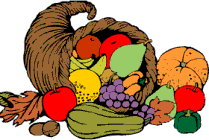| Ever wonder how the cornucopia became a symbol of Thanksgiving? Well, wonder no more! The answer lies within our tale..... THE HORN OF PLENTY
BY OVID [ADAPTED] 
AENEUS, King of Ætolia, had a daughter whose name was Deïanira. So beautiful was the maiden that her fame spread throughout the world, and many princes came to woo her. Among these were two strangers, who drove all the other suitors from the hall of King Æneus.
One was Hercules, huge of limb and broad of shoulder. He was clad in the skins of beasts, and carried in his hand a knotted club. His tangled hair hung down upon his brawny neck, and his fierce eyes gleamed from behind his shaggy brows.
The other stranger was Acheloüs, god of the Calydonian River. Slender and graceful was he, and clad in flowing green raiment. In his hand he carried a staff of plaited reeds, and on his head was a crown of water-lilies. His voice was soft and caressing, like the gentle murmur of summer brooks.
"O King Æneus," said Acheloüs, standing before the throne, "behold I am the King of Waters. If thou wilt receive me as thy son-in-law I will make the beautiful Deïanira queen of my river kingdom." "King Æneus," said the mighty Hercules, stepping forward, "Deïanira is mine, and I will not yield her to this river-god." "Impertinent stranger!" cried Acheloüs, turning toward the hero, while his voice rose till it sounded like the thunder of distant cataracts, and his green garment changed to the blackness of night, -- "impertinent stranger! how darest thou claim this maiden, -- thou who hast mortal blood in thy veins! Behold me, the god Acheloüs, the powerful King of the Waters! I wind with majesty through the rich lands of my wide realms. I make all fields through which I flow beautiful with grass and flowers. By my right divine I claim this maiden." But with scowling eye and rising wrath Hercules made answer. "Thou wouldst fight with words, like a woman, while I would win by my strength! My right hand is better than my tongue. If thou wouldst have the maiden, then must thou first overcome me in combat." Thereupon Acheloüs threw off his raiment and began to prepare himself for the struggle. Hercules took off his garment of beasts' skins, and cast aside his club. The two then anointed their bodies with oil, and threw yellow sand upon themselves. They took their places, they attacked, they retired, they rushed again to the conflict. They stood firm, and they yielded not. Long they bravely wrestled and fought; till at length Hercules by his might overcame Acheloüs and bore him to the ground. He pressed him down, and, while the fallen river-god lay panting for breath, the hero seized him by the neck. Then did Acheloüs have recourse to his magic arts. Transforming himself into a serpent he escaped from the hero. He twisted his body into winding folds, and darted out his forked tongue with frightful hissings. But Hercules laughed mockingly, and cried out: "Ah, Acheloüs! While yet in my cradle I strangled two serpents! And what art thou compared to the Hydra whose hundred heads I cut off? Every time I cut of I one head two others grew in its place. Yet did I conquer that horror, in spite of its branching serpents that darted from every wound! Thinkest thou, then, that I fear thee, thou mimic snake?" And even as he spake he gripped, as with a pair of pincers, the back of the river-god's head. And Acheloüs struggled in vain to escape. Then, again having recourse to his magic, he became a raging bull, and renewed the fight. But Hercules, that mighty hero, threw his huge arms over the brawny neck of the bull, and dragged him about. Then seizing hold of his horns, he bent his head to one side, and bearing down fastened them into the ground. And that was not enough, but with relentless hand he broke one of the horns, and tore it from Acheloüs's forehead. The river-god returned to his own shape. He roared aloud with rage and pain, and hiding his mutilated head in his mantle, rushed from the hall and plunged into the swirling waters of his stream. Then the goddess of Plenty, and all the Wood- Nymphs and Water-Nymphs came forward to greet the conqueror with song and dance. They took the huge horn of Acheloüs and heaped it high with the rich and glowing fruits and flowers of autumn. They wreathed it with vines and with clustering grapes, and bearing it aloft presented it to Hercules and his beautiful bride Deïanira. And ever since that day has the Horn of Plenty gladdened men's hearts at Harvest-Time. 
PAGE DESIGN, CORNUCOPIA BACKGROUND, & NEXT BITTON BY FOREVER AMBER CLIP ART FROM A FREEBIE SITE 
|  Free Forum Hosting
Free Forum Hosting